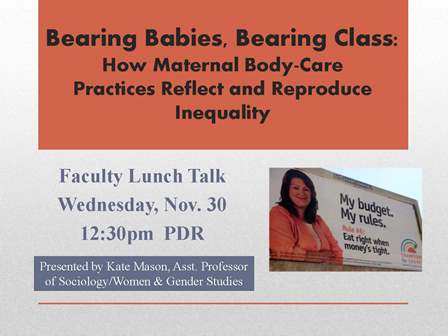Bearing babies, bearing class: How maternal body-care practices reflect and reproduce inequality
Professor Mason’s research uses interviews and participant observation to ask how mothers in different classes grapple with the medicalized demands of pregnancy and new motherhood. For middle-class women, striving to meet the increased bodily expectations of motherhood can create intense feelings of competition and status anxiety as they adopt various body-care regimens (often described as part of the so-called “Mommy Wars”). For the poor and working-class women Professor Mason will talk about this week, however, health and nutrition education programs offer young, single mothers—often women of color—the chance to be recognized simply as “good mothers” so long as they “make healthy choices” and care for their bodies in state-approved ways. Looking at the case of the Women, Infants, and Children (WIC) Program, Professor Mason examines both the ideological underpinnings of this approach as well as its practical effects.
Presented by Kate Mason, Asst. Professor of Sociology, Women’s and Gender Studies
Wednesday, November 30th
12:30 p.m. President’s Dining Room

-
Categories:
- Provost